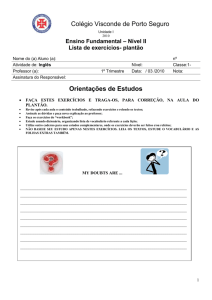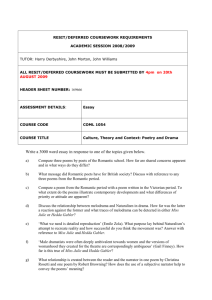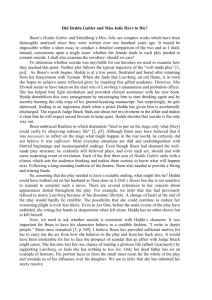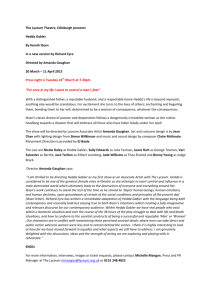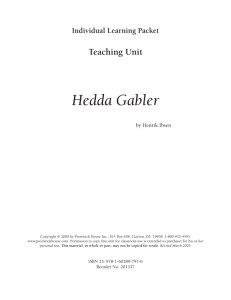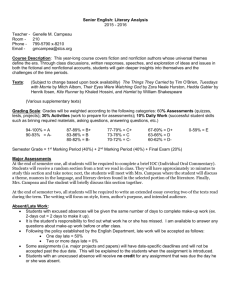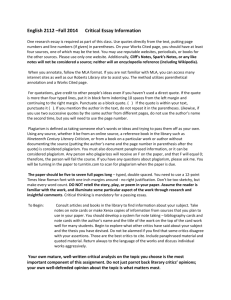Critical Review of Ibsen's Female Character Hedda Gabler
advertisement
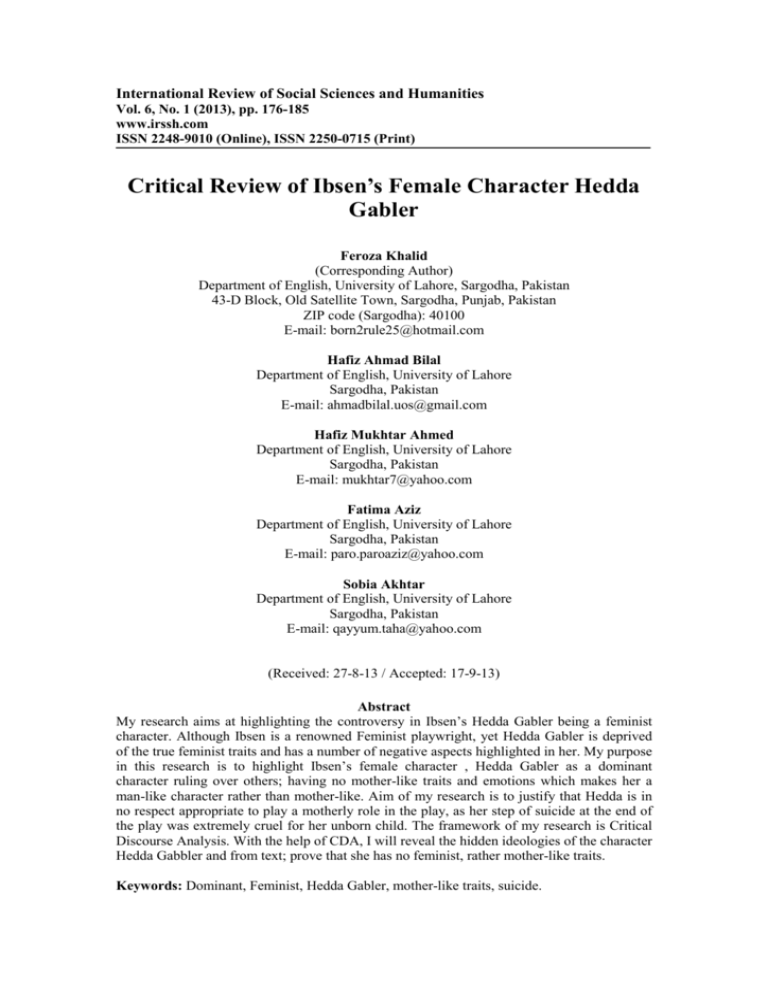
International Review of Social Sciences and Humanities Vol. 6, No. 1 (2013), pp. 176-185 www.irssh.com ISSN 2248-9010 (Online), ISSN 2250-0715 (Print) Critical Review of Ibsen’s Female Character Hedda Gabler Feroza Khalid (Corresponding Author) Department of English, University of Lahore, Sargodha, Pakistan 43-D Block, Old Satellite Town, Sargodha, Punjab, Pakistan ZIP code (Sargodha): 40100 E-mail: born2rule25@hotmail.com Hafiz Ahmad Bilal Department of English, University of Lahore Sargodha, Pakistan E-mail: ahmadbilal.uos@gmail.com Hafiz Mukhtar Ahmed Department of English, University of Lahore Sargodha, Pakistan E-mail: mukhtar7@yahoo.com Fatima Aziz Department of English, University of Lahore Sargodha, Pakistan E-mail: paro.paroaziz@yahoo.com Sobia Akhtar Department of English, University of Lahore Sargodha, Pakistan E-mail: qayyum.taha@yahoo.com (Received: 27-8-13 / Accepted: 17-9-13) Abstract My research aims at highlighting the controversy in Ibsen’s Hedda Gabler being a feminist character. Although Ibsen is a renowned Feminist playwright, yet Hedda Gabler is deprived of the true feminist traits and has a number of negative aspects highlighted in her. My purpose in this research is to highlight Ibsen’s female character , Hedda Gabler as a dominant character ruling over others; having no mother-like traits and emotions which makes her a man-like character rather than mother-like. Aim of my research is to justify that Hedda is in no respect appropriate to play a motherly role in the play, as her step of suicide at the end of the play was extremely cruel for her unborn child. The framework of my research is Critical Discourse Analysis. With the help of CDA, I will reveal the hidden ideologies of the character Hedda Gabbler and from text; prove that she has no feminist, rather mother-like traits. Keywords: Dominant, Feminist, Hedda Gabler, mother-like traits, suicide. International Review of Social Sciences and Humanities, Vol. 6, No. 1 (2013), 176-185 177 Introduction: Feminism is an anthology of movements and ideologies intended to define, ascertain and shield equal political, economic, and social rights for women. Feminists advocate or support the civil liberties and equality of women and also promote corporal respectability, independence and reproductive rights for women. But feminism should be favourd only if it provides some sort of benefit. This so-called feminism is merely destroying and ruining many family lives. The family systems and family relations are falling a prey to feminism. Women are destroying their marital relations by wearing the chains of feminism, depriving their children of motherly love and leaving behind their homes. This is leading to increased divorce rates in Europe. Females are becoming the torch bearers of Feminism at large. However, in the present topic of research, Hedda Gabler though depicting a feminist character is truly deprived of the feminist traits that women commonly possess. Ibsen, the renowned feminist playwright has failed to mould her into a true feminine character, and yet although Hedda is in no respect capable of being called a woman, still we find her the victim of feminism. This can be revealed through the textual analysis of Hedda Gabler using the Fairclough model of CDA. According to Habermas’s (1973) critical theory, the aim of CDA is to help the analyst to grasp social problems that are mediated by typical doctrine and power relations, all perpetuated by the use of written texts in our professional and daily lives. CDA is concerned with studying and analyzing written texts and spoken words to expose the discursive sources of power, domination, disparity, and prejudice and how these sources are initiated, maintained, reproduced, and altered within precise social, economic, political, and historical contexts (Van Dijk, 1988). The aim of CDA is to reveal the ideological assumptions that are concealed in the words of our written text or spoken speech in order to defy and surmount diverse forms of power over or to achieve an approval that we are exercising "power over,” unbeknownst to us (Fairclough, 1989)/ When the power of the written and spoken word is given, CDA is essential for unfolding, interpreting, analyzing, and criticizing communal life reflected in text (Luke, 1997). Researchers have acknowledged, a broad assortment of contexts in which men as well as women portray the discourse of power and influence in constructing their professional and social identities and, where they consider it important, take up discourse styles and strategies; normatively associated with manliness (e.g. McElhinny 1995) or femininity (eg. Holmes 2006, Mullany 2007). Under the framework of CDA, the text of Ibsen’s Hedda Gabler will be analysed and the fact that Hedda is deprived of feminine traits will be highlighted. The play is a feminist one but its leading character is in no respect feminine, rather it is a harsh, shrewd and masculine one. This play has been selected in order to highlight the true meaning of a woman. In feminist perspective we find that neither is Hedda being beaten or snubbed by her husband and neither are her rights being snatched. She is living quiet liberally rather. The so-called feminism and the boundless liberty it provides is merely a source of destruction for many women depriving them of motherly love and injecting them with frustration, depression and annoyance. Hedda is a victim of all the negative qualities that can be imagined. Ibsen has tried to move away from the stereotypical women by sketching feminist plays but yet when he deprives the woman of her doll-like exquisiteness and angelic beauty, he still remains confined to the stereotypical women, rather makes them merely monstrous and treacherous. Summary: Hedda Gabler; the daughter of an upper-class general, has just returned from her honeymoon. Her husband is George Tesman, a hopeful, young, unswerving academic who has pooled research with their honeymoon. Hedda does not love Tesman; she has married him only for a social security. It is also suggested in the play that she may be pregnant. The return of Eilert Feroza Khalid et al. 178 Lovborg, throws their lives into frenzy. Lovborg is also a recovered alcoholic and a writer. Up till now he had wasted his talent. Due to a relationship with Hedda's old schoolmate Thea Elvsted, who is Hedda’s old classmate, Lovborg shows signs of rehabilitation and has just completed a bestseller in the same field as Tesman. Thus, Lovborg becomes a competitor of Tesman. But after meeting Lovborg, Tesman and Hedda discover that Lovborg has no intention to compete with Tesman for the university professorship he had been counting on. Hedda is jealous of Thea’s power over Lovborg and thus urges him to accompany Tesman and his associate Judge Brack to a party. Tesman comes back from the party with Lovborg’s masterpiece manuscript, which Lovborg had misplaced due to being drunk. Later Lovborg confesses to Hedda that he had lost the manuscript. Instead of telling him that the manuscript is safe, Hedda gives him her father’s pistol and encourages him to commit suicide beautifully. She burns the manuscript out of spite and jealousy but poses in front of Tesman that she did so in order to secure their future. When news of Lovborg’s death arrives, Tesman and Thea set themselves to renovate the manuscript from Lovborg’s notes. As Judge Brack knows about Hedda’s pistols; he tells Hedda that if he reveals the truth, Hedda would become involved in a big scandal. As Hedda cannot tolerate anyone exercising power over her, she shoots herself in the head. The play ends with her body being discovered by Thea and Brack. Literature Review When the play was first launched in 1891, it caused a great scandal. Some critics branded it as immoral and sordid. The play had truly shocked audience who hissed, catcalled, and walked out. It bore criticisms of the traditional gender roles of marriage and society. While some critics were impressed by Ibsen's originality and courage, the ending needed to be rewritten for the German production because Actresses refused to perform the piece, and the play was banned from discussion in polite company. The play was poorly received at the Moscow Art Theatre. The February 1899 production was reviewed badly and served as a total disaster from the view point of both, the public and the theatre. It was impossible to bring Ibsen fervently to the stage because the players did not comprehend the motivations of his characters as they understood Chekhov’s. The spectators reacted with perplexity and displeasure towards the play. After watching the rehearsals for the 1899 production Chekhov made the remark, “Ibsen is no playwright!” Nilsson (1899) The Danish critic George Brandes found her “A true type of degeneration (incapable) of yielding herself, body and soul, to the man she loves.” George Brandes (1891) Hedda is Married to George Tesman but still we find that instead of using her husband’s name as women do after marriage, she is still attatching her father’s name with her. It shows clearly the lacking womanly maternal love and respect for her husband. The use of her maiden name symbolizes her independence from her husband and marriage. Unlike obedient and loving wives Hedda is in constant want of escape from this matrimonial bliss. Even Ibsen himself claims that Hedda is not her husband’s wife in true sense; rather she is her father’s daughter still after marriage. On June 19, 1890 Ibsen wrote from Munich to the Swedish poet, Count Carl Soilsky: International Review of Social Sciences and Humanities, Vol. 6, No. 1 (2013), 176-185 179 “My intention in giving it this name was to indicate that Hedda as a personality is to be regarded rather as her father's daughter than her husband's wife.” Ibsen, Letter 217 (Dec 4, 1890) In the Merriam Webster Encyclopedia of Literature the portray of Hedda Gabler is given as: “Hedda Gabler is a selfish cynical woman bored by her marriage to the Scholar Jorgan Tesman.” (The Merriam Webster Encyclopedia of Literature) Joseph Wood thought that: “Hedda was an evil woman” Joseph Wood, (1953) Hedda is in a constant desire to manipulate others. She is extremely jealous and likes to hold power over others. Women should be timid, obedient and loving towards their family, but we find Hedda far away from these characteristics. She is mean and always finds some ways to hurt and torture others. Caroline Mayerson gave the following views: “….she [Hedda] may be held accountable for her behavior. But she is spiritually sterile. Her yearning for self realization through exercise of her natural endowments is in conflict with her enslavement to a narrow standard of conduct.” Caroline Mayerson (p. 131-138, 1965) Hedda is inwardly coward. She is always fearful of scandals. In contrast, however, Thea is loyal and courageous in disclosing her love for Eilert Lovborg openly. Hedda ends up devastating others as well as her own life in effortless blunders. Caroline Mayerson concludes her essay on the play: “Her colossal egotism, her lack of self-knowledge, her cowardice, renders her search for fulfillment but a succession of futile blunders which culminate in the supreme futility of death. Like Peer Gynt she is fit only for the ladle of the button-moulder; she fails to realize a capacity either for great good or for great evil.” Caroline Mayerson, (p. 131-138, 1965) F.L.Lucas claims Hedda to be a twentieth century New Woman, "…the idle, emancipated woman--and what she is to do with her emancipation, the devil only knows." F.L. Lucas (1962) The mere surface study may lead some supporters to think that the play is a promoter of Feminism, but use of the two symbols actually weakens the feminist elements. Feroza Khalid et al. 180 “Boredom, the “scourge . . . unknown among revolutionists” and her cowardice poisons her potential.” Bernard Shaw (1913) Elizabeth Robins claimed that a relationship does exist “…between Hedda's inarticulate rage at her inability to control her own destiny and the suffragists' indignation at not having their rights recognized.” Penny (March, 1996) Hedda wants to change the destiny of others. She wishes the destiny of others to be in her hands. In her evilness we find many other characters to which she can be compared. For example, she resembles Iago of “Othello” for her mean spiritedness. She also resembles the selfish Nora of Ibsen’s “A Doll’s House”. On the other hand if Hedda had been softer and womanly, she would have resembled the loving wife and mother, Mrs. Ramsay in “The Light House”. Ibsen himself says: “The worst that a man can do to himself is to do injustice to others.” Henrik Ibsen, (Dec 28, 1867) Really to sin one has to be serious about it. Discussion: Feminism may be called as the promotion of women's rights on the basis of political, social, and economic equality to men. With the “Women’s Liberation” movement of the 1960’s and 1970’s, Feminism became even more intense. Women of this movement believe, among other things, that they should be identical to men in every manner. In its present form Feminism is a perilous and unconstructive approach. Actually it scorns womanhood by implying that as a woman I’m not good enough and that I must be equal to a man. Men and women have equal dignity in reality but only different designs. Modern Feminists have the view that they can be everything that a man is which is not practicable either biologically as well as physiologically. In order to become equal to men, they have gone a bit too far and completely shunned their innate qualities. The breakdown of a family results when women forget their unique role. Marriage is a sanctified treaty, in which men and women play the role of husband and wife and become partners of each other’s happiness and sorrows. In this sacred matrimony the man is the leader and protector of the family whereas the woman is the bearer and nurturer of life. A stable, loving and congenial environment can be formed only when both men and women play their unique roles properly. In case one partner neglects or rejects his/ her role; the marriage will begin to fall apart. Modern Feminism is merely a deception which injects only and only confusion leading women to undermine their inherent roles. This anti-life mentality and lifestyle provokes women to plainly sever that special bond with her child. Women weaken their relationships with their husbands by deliberately killing the life which they had created together. Feminism provoked women to shun marriage only because it included promises to be faithful, In addition, women began shunning marriage because it included promises to be faithful, conscientious and totally submissive towards their husbands. Even after marriage a number of women still remain career oriented, they put off having a family for several years and put their careers above their children and their husbands. Even after they marry, many of today’s women put their careers above children, or put off having a family for several years. They only think of marriage as something rather gratifying. The unconstructive roots of feminism are spreading not only in family lives but also in work places, the education International Review of Social Sciences and Humanities, Vol. 6, No. 1 (2013), 176-185 181 system as well as in government too. The so-called feminism has done nothing except disrupting the sole unit, i.e., the family unit. It has merely introduced confusion in the families, leading to arguments, frustration of mind, neglection of duties and loveless relationships. These loveless relationships are mostly ending in divorce; depriving the children of motherly love and peace of mind. Feminism has just served to dishonor motherhood to concepts of slavery and sub human. All this progress is only destroying the traditional family. Today more than ever, it is necessary for women to salvage their womanly poise and validity. They are equal to men, as human beings; but as ladies, they have exquisite and delicate qualities which they mustn’t forget to embrace. The irony today is that, women are no more wrapped in their conventional roles of faithfulness, loyalty, love, care and sacrifice. We find feminism leading to monstrous malelike characteristics in the females. Women such as Hedda are not capable of being called women. The monstrous, evil green-eyed characteristics such as treachery, jealousy, domination over others and playing with others fate; are such traits that no longer let a woman remain womanly. The angelic qualities of women are hence lost behind. The so called liberation leads to devastation merely. If everyone will be free to act according to his/her own personal desires, will and ideology, then certainly there will be disintegration everywhere in the society. As J.S.Mill says in his essay, “On Liberty”: “Individual is free only as long as he does not harm other people. Individual should have freedom of expression and freedom of action but if this freedom adversely affects others, a person should be held accountable for that.” Here the play “Hedda Gabler” is being discussed, which is a renowned feminist play. However the leading character, Hedda is in no respect feminine. She lacks the scarifying and angelic womanly qualities. We find her acting as the manipulator of fates. We find that General Gabler’s daughter, Hedda has married Tesman. She is bound by social norms and cannot dare to risk a challenge from the society by marrying a depraved rake as Lovborg. She ends up in a loveless marriage with Tesman. A faithless conventional life leads her to tediousness and poignant unproductiveness. She is cruel and mean to Aunt Julia and Mrs. Elvsted and contracts a devious association with Brack. Reading the play, we come to know that Tesman has financially overwrought himself only in order to provide Hedda with the luxuries she was accustomed to. He cares a lot for Hedda and tries to keep her as pampered as her father had kept her. Inspite of all this, we find Hedda very emotionless and quiet indifferent towards her husband. She is quiet cruel towards Tesman when he tells her about his slippers. TESMAN: My old morning-shoes! My slippers. HEDDA: Indeed. I remember you often spoke of them while we were abroad. TESMAN: Yes, I missed them terribly. [Goes up to her.] Now you shall see them, Hedda! HEDDA: [Going towards the stove.] Thanks, I really don't care about it. TESMAN: [Following her.] Only think--ill as she was, Aunt Rina embroidered these for me. Oh you can't think how many associations cling to them. HEDDA: [At the table.] Scarcely for me. Ibsen, H. Act 1(1926) Such attitude is not the loving quality of women. As a loving and caring wife, Hedda should have showed concern in Tesman’s happiness and shared his happiness. But Hedda lacks such womanly traits. Hedda is mean spirited when she is deliberately calling Aunt Julies bonnet as the maid’s. Feroza Khalid et al. 182 HEDDA: [Interrupting.] We shall never get on with this servant, Tesman. MISS TESMAN: Not get on with Berta? TESMAN: Why, dear, what puts that in your head? Eh? HEDDA: [Pointing.] Look there! She has left her old bonnet lying about on a chair. TESMAN: [In consternation, drops the slippers on the floor.] Why, Hedda--HEDDA: Just fancy, if any one should come in and see it! TESMAN: But Hedda--that's Aunt Julia's bonnet. HEDDA: Is it! Ibsen, H. Act 1(1926) Further in the play, Hedda herself admits that she did it deliberately. BRACK: What bonnet were you talking about? HEDDA: Oh, it was a little episode with Miss Tesman this morning. She had laid down her bonnet on the chair there--[Looks at him and smiles.]-- and I pretended to think it was the servant's. BRACK: [Shaking his head.] Now my dear Mrs. Hedda, how could you do such a thing? To the excellent old lady, too! HEDDA: [Nervously crossing the room.] Well, you see--these impulses come over me all of a sudden; and I cannot resist them. [Throws herself down in the easy chair by the stove.] Oh, I don't know how to explain it. Ibsen, H. Act 2(1926) Once again females should be tender and loving, rather than being mean and spiteful like Hedda. Hjalmer Boyeson called her as: “A complete perversion of womanhood.” James Huneker, calls her “The deficient woman, The loveless woman.” Hedda is so much heartless that she negates the most loving feeling of womanhood i.e. her pregnancy. TESMAN: [Following.] Yes, but have you noticed what splendid condition she is in? How she has filled out on the journey? HEDDA: [Crossing the room.] Oh, do be quiet---! MISS TESMAN: [Who has stopped and turned.] Filled out? TESMAN: Of course you don't notice it so much now that she has that dress on. But I, who can see--HEDDA: [At the glass door, impatiently.] Oh, you can't see anything. TESMAN: It must be the mountain air in the Tyrol--HEDDA: [Curtly, interrupting.] I am exactly as I was when I started. TESMAN: So you insist; but I'm quite certain you are not. Don't you agree with me, Auntie? MISS TESMAN: [Who has been gazing at her with folded hands] Hedda is lovely--lovely-lovely. [Goes up to her, takes her head between both hands, draws it downwards, and kisses her hair.] God bless and preserve Hedda Tesman—for George's sake. HEDDA: [Gently freeing herself.] Oh--! Let me go. Ibsen, H. Act 1(1926) The happiest moment of a married woman’s life is that when she is being bestowed with a child. But Hedda is emotionless towards this womanly rather motherly feeling which proves that she is not feminine like other ladies of her class. Hedda Gabler is “a hideous nightmare of pessimism”. Throughout the play we find that she lacks the love for her husband, she has no interest in her impending motherhood or even in her future as George’s obedient wife. Her “soul is found to be is acrawl with the foulest passions of humanity.” International Review of Social Sciences and Humanities, Vol. 6, No. 1 (2013), 176-185 183 Hedda moves on so far enough by confiding in a third man, Judge Brack and insulting her husband by telling Brack how bored she was by her husband at their honeymoon trip.` HEDDA: And then, what I found most intolerable of all--BRACK: Well? HEDDA: ---was being everlastingly in the company of--one and the same person— Ibsen, H. Act 2(1926) Hedda is also a very lustful lady as she remains intimate with Judge Brack and accepts his offer in forming a triangle of three. BRACK: But suppose a third person were to jump in and join the couple. HEDDA: Ah--that is quite another matter! BRACK: A trusted, sympathetic friend--HEDDA: ---with a fund of conversation on all sorts of lively topics--BRACK: ---and not the least bit of a specialist! HEDDA: [With an audible sigh.] Yes, that would be a relief indeed. BRACK: [Hears the front door open, and glances in that direction.] The triangle is completed. HEDDA: [Half aloud.] And on goes the train. Ibsen, H. Act 2(1926) The construction or destruction of a family lies in the hands of women. They can either build up their homes into loving and nourishing places or they may tear up their families by neglection and disloyalty. Hedda is at the verge of tearing apart this relationship due to her adulterous nature. The ancient Philosopher Confucius gives the views that: “Where the woman is faithful, no evil can befall. The woman is the root and the man is the tree. The tree grows only as high as the root is strong.” Hedda seems more of a monster than a woman. She likes to play with the destiny of others. Rather she wishes to shape others life according to her own will. HEDDA: Then life would perhaps be liveable, after all. [With a sudden change of tone.] But now, my dearest Thea, you really must have a glass of cold punch. MRS. ELVSTED: No, thanks--I never take anything of that kind. HEDDA: Well then, you, Mr. Lovborg. LOVBORG: Nor I, thank you. MRS. ELVSTED: No, he doesn't either. HEDDA: [Looks fixedly at him.] But if I say you shall? LOVBORG: It would be of no use. HEDDA: [Laughing.] Then I, poor creature, have no sort of power over you? Ibsen, H. Act 2(1926) Hedda herself even admits that she wants to be the powerful one in order to shape the destinies of people. This shows that unlike an exquisite timid female, she wishes to dominate others. She is hideous in her aims. MRS. ELVSTED: You have some hidden motive in this, Hedda! HEDDA: Yes, I have. I want for once in my life to have power to mould a human destiny. Ibsen, H. Act 2(1926) Feroza Khalid et al. 184 The Norwegian Critics refused to accept Hedda as a woman altogether. She depicts such monstrous qualities that are incredible and cannot be found in real life. The Norwegian view holds: “Hedda to be a horrid miscarriage of the imagination, She is a monster female form to whom no parallel can be found in real life” In 1891 when the play was performed in London, the general view that it raised was that: “Hedda Gabler is manifestly a lunatic” Also, a Norwegian critic called her: “…Monster created by the author in the form of a woman who has no counterpart in the real world.” Hedda is heartless on hearing about the death of Aunt Rina. Instead of going for condoling Aunt Julie on this sad occasion she refuses to go as she hates ugliness. TESMAN: Oh, my dearest Hedda--if you could only make up your mind to come with me! Just think! HEDDA: [Rises and says wearily, repelling the idea.] No, no don't ask me. I will not look upon sickness and death. I loathe all sorts of ugliness. Ibsen, H. Act 3(1926) Hedda wants to see beauty in death even, instead of motivating Lovborg towards the right path; she is destructive enough to lead him towards committing suicide and even promises him to do it beautifully. HEDDA: What path do you mean to take then? LOVBORG: None. I will only try to make an end of it all--the sooner the better. HEDDA: [A step nearer him.] Eilert Lovborg--listen to me.--Will you not try to--to do it beautifully? Ibsen, H. Act 3(1926) Hedda is possessed with jealousy, mean spiritedness and destructive qualities. Once again it proves that she is not a motherly character. She has no love and emotions for children as can be depicted by her dialogue when she is burning Lovborg’s manuscript while imagining it to be Thea’s child. HEDDA: [Throws one of the quires into the fire and whispers to herself.] Now I am burning your child, Thea!--Burning it, curly-locks! [Throwing one or two more quires into the stove.] Your child and Eilert Lovborg's. [Throws the rest in.] I am burning--I am burning your child. Ibsen, H. Act 3(1926) Hedda is evil from inside she rejoices by hurting others. She deliberately tries to create a misunderstanding between Thea and Lovborg. At the end of the play her final decision of suicide is even more devastating. No woman wishes to leave her family behind for nothing. Her step of suicide would have been justified if she had been living in a repressing and frustrated environment, or if she had been living in a miserable plight or even if she had been deprived of luxuries. But since there was no such situation in the present case, rather Hedda had been leading a luxurious life and there was no restriction on her. Thus Hedda’s act of suicide was totally selfish and cruel for her unborn child as well as her considerate husband. International Review of Social Sciences and Humanities, Vol. 6, No. 1 (2013), 176-185 185 Conclusion: Hedda’s conduct thus proves in every way that she is deprived of womanly exquisite traits. She loves to hurt others and rather enjoys such hideous acts. She is not a dutiful and obedient wife. She has no love and respect for her husband. She has grotesque aims and wishes to exercise power over others. She wants to play the role of a ruling god rather than that of a human, more specifically of a woman. Females no matter how mean they are do not possess such heinous traits. Ibsen in his attempt to create the female character, Hedda Gabler has gone out of his way to create a monster or a demon rather than a feminine character. Yet Ibsen is claimed to be a celebrated Feminist playwright. But his feminine character does not correspond with the true female. His female is merely a manifestation of maliciousness, loathing and foul passions. She is such a character that even the imagination cannot come up with. Hedda is deprived of motherly and wife-like passions. Throughout the play she is negating her motherhood and pregnancy. She is weaving an intricate web of the foulest passions in which she wishes to strangle her victims and rule over them. She enjoys snubbing those around her. She can be compared to the Lord Voldemort of Harry Potter written by J.K. Rowling. The only difference between the two is that Lord Voldemort rejoiced by killing his victims mercilessly, but on the other hand Hedda doesn’t kill her victim herself rather she mercilessly persuades him to do it himself and even provides him her guns to do so. She is thus; unfit to be called a feminine character. She is in fact a demon. How can a loving wife neglect and torture her husband? How can she insult her husband and his relatives? How can a female negate her child? How can she develop relations with other men? How can she torment people around her? How can a mother even think of burning a child when she herself is going through this glorious phase of construction? How can a female commit suicide and close all doors of life for her yet unborn child? All these acts show that Hedda is not a true feminine character and is deprived of all womanly qualities. It seems to me that Hedda possessed a stone heart and is deprived of motherly love, compromise and house building qualities. References [1] [2] [3] [4] [5] [6] [7] [8] [9] [10] [11] [12] G.B. Shaw, The Quintessence of Ibsenism: Now Completed to the Death of Ibsen, (1913), New York: Brentano’s, Print, Farfan. N. Fairclough, Language and Power, (1989), New York: Longman. H. Ibsen, Letter to Bjornstjerne Bjornson, (1867), Nabu Press (August 18, 2010). H. Ibsen, Hedda Gabler, (1926), Ebook (Available Online), http://www.fullbooks. com/Hedda-Gabler.html. H. Ibsen, Letter to Count Prozor, (1890), Nabu Press (August 18, 2010). J. Holmes and M. Marra, Femininity, Feminism and Gendered Discourse: A Selected and Edited Collection of Papers from the Fifth International Language and Gender Association Conference (IGALA5), (2010), Cambridge Scholars Publishing. J. Wood, Modernism in Modern Drama, (1953), Cornell University Press. A. Luke, Theory and practice in critical science discourse, International Encyclopedia of the Sociology of Education, (1997), 50-56, NY: Pergamon. W.C. Mayerson, Thematic Symbols in Hedda Gabler: A Collection of Critical Essays, (1965), 131-138, Englewood Cliffs, N.J.: Prentice Hall, Inc. Penny, From ‘Hedda Gabler’ to ‘Votes for Women’: Elizabeth Robins’s early feminist critique of Ibsen, Theatre Journal, 48(1) (March) (1996), 59-78. L.T. McGregor Sue, Critical Science and Critical Discourse Analysis (Vol. 15), (2003), Department of Education, Mount Saint Vincent University, Halifax, NS. V. Dijk, News as Discourse, (1988), Hillside, NJ: Erlbaum.
